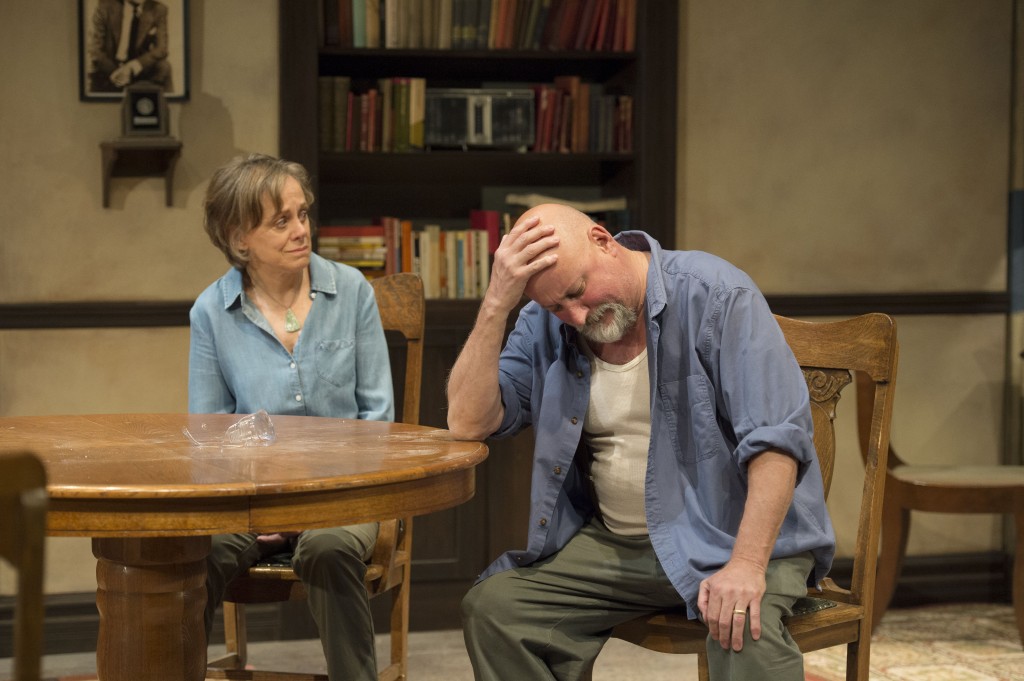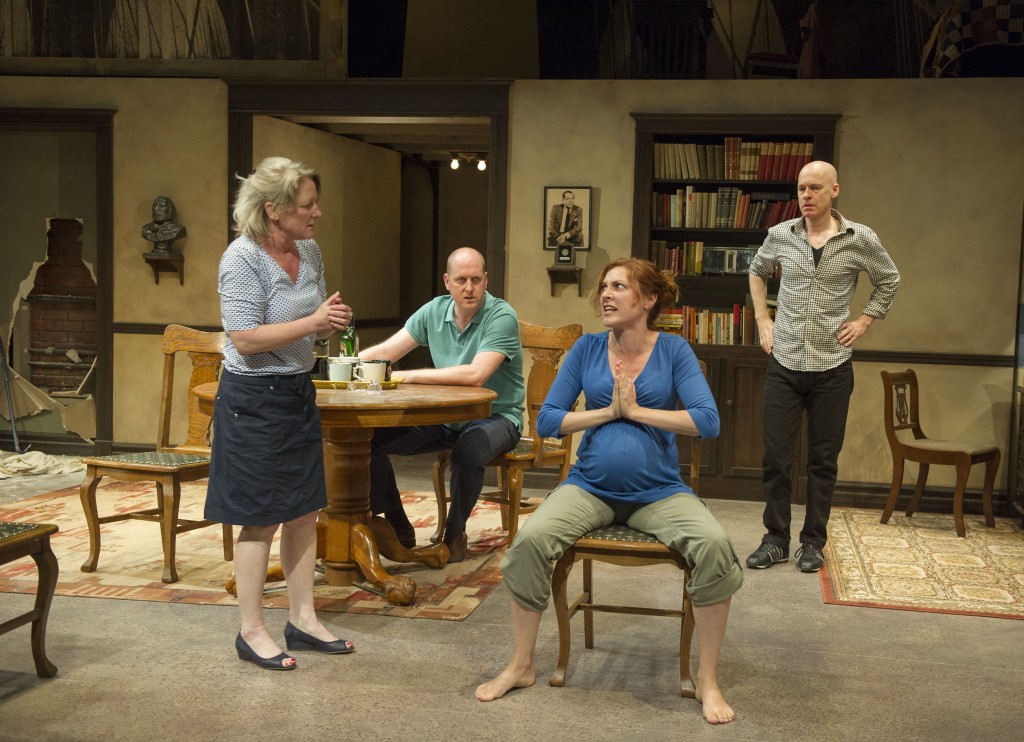 The Shaw Festival’s production of Tony Kushner’s “The Intelligent Homosexual’s Guide to Capitalism and Socialism with a Key to the Scriptures” resonates with deep and elusive truth on a number of levels. We in the audience cannot avoid what we hear and see before us, often unrelenting and impossibly difficult to resolve as it is, but we can try to understand the complexities of each character and try, perhaps, to recognize what realities there are here about ourselves that we choose to avoid. There is human rawness before us, one which is certainly different from emotions played on television to tinkling pianos that telegraph them. Rather, the music here is in the writing, the acting, and the direction, and it sings in many shadings of the human heart. This production offers many truths and if we run from them we run from ourselves. Each character’s struggle is a mirror to part of our existence.
The Shaw Festival’s production of Tony Kushner’s “The Intelligent Homosexual’s Guide to Capitalism and Socialism with a Key to the Scriptures” resonates with deep and elusive truth on a number of levels. We in the audience cannot avoid what we hear and see before us, often unrelenting and impossibly difficult to resolve as it is, but we can try to understand the complexities of each character and try, perhaps, to recognize what realities there are here about ourselves that we choose to avoid. There is human rawness before us, one which is certainly different from emotions played on television to tinkling pianos that telegraph them. Rather, the music here is in the writing, the acting, and the direction, and it sings in many shadings of the human heart. This production offers many truths and if we run from them we run from ourselves. Each character’s struggle is a mirror to part of our existence.
One strength of Eda Holmes’ take on Kushner is that, although we have only partial indication of who each character is, we do know, in the complexity of his or her life, how each feels intensely and how each fucks up. In every self- destructive relationship – like that of Steven Sutcliffe’s Phil and Ben Sanders’ hustler Eli, or Kelly Fox’s Empty and her ex, Adam, played by Thom Marriott – we cannot feel any certainty about whom to believe or which side to take. We watch people like ourselves in some way falling apart, turning bitter, becoming withdrawn, or escaping into an inner distance of some kind. We are taken into a family and its extensions, with all the yelling and pushing and all the shouting others down, even as each draws others closer to them. These people speak articulate and often intellectually literate words, even as they also speak truth-rooted, rip your guts out dialogue with its unending and unresolvable human issues. Each character seems the tip of a very deep psychological iceberg.
In this family centered play, the father Gus, his children, his sister Clio, Empty’s ex and some partners together display resentment in all directions and make admissions, like Gus to daughter Empty: “Maybe I kept too much of you to myself.” Their family gatherings are every one a family battleground in which one hurls a personal pain into the collective family pot and rarely gets heard in the many simultaneous conversations. These are worn down lives, each one bound to ties that destroy them, and it’s no wonder that Empty declares, “I just want to be anyplace else,” even as they protect the fuck ups of one another. Meanwhile, we have talk of the connection of Marxist theory and sex, the impact of one’s suicide on the others, organized labour in the Reagan era, gay children in gay relationships, impending economic collapse, parental damage to children, selling the family home, and whether one gives up on revolution and joins the status quo. In all of this, one never has a handle on life.
Eda Holmes directs this production with precise and subtle understanding of how people function together, how they handle inner and outer turmoil, and how they tentatively look inward. She also maintains emotional and intellectual momentum in a play that clocks in at almost four hours. In return, each in her cast responds with a performance of honesty, depth and emotional courage. For one, Jim Mezon’s Gus, who must face a painful truth for an activist that, “Nothing changes.” He must accept that there is no future and that he can do nothing about it in “this hollow world of shit.” He is a man who erupts and cracks open all at one time, a man of regret who declares, “I could have been a classics guy, I would have loved doing that.” He is a man who must deal with life’s paradox: “The best thing I ever did was the worst thing I ever did”. And a man who looks his existence in the eye: “You want to live and I don’t any more”. Mezon’s is a monumental and nuanced performance.
Gus’s daughter, Kelly Fox’s Empty, is worldly-wise and sensual, wired and worn, a woman of high powered rawness, a woman whose inner pain develops over slow seconds of time. She has to understand and accept the reasons of a man, her father, who finds no longer a reason to live, and the reasons he wants to die. This is the father who made her: “I didn’t have baby stories from you, you gave me domestic workers’ statistics.” In this complex and true to the gut performance, Fox is an actress who can make a whole room hold its breath. Fiona Reid’s Clio, Gus’s sister and a former nun and former Maoist, is a woman of life experience and intuitive understanding that help her with impossible decisions. In one moment, Clio seems as flat as an apple squashed on the sidewalk, and then she is a woman guilt free and of will and wise resolution. There is an undercurrent of unspoken character in Reid’s performance, one that is mastery itself in creating a lifetime implied.
As Gus’s older son Phil, Steven Sutcliffe is both introspective and an inwardly volatile man who signals and acts out inner turmoil. He is “afraid of being a fearing man” and is one who also declares, “I have never know how to live without breaking.” To his father, he says simply, “Please don’t die”. He is also a man who blows his sister’s substantial wad of money on “a guy I loved”, a deed which the others must inwardly resolve. The guy is Ben Sanders’ Eli, an intensely manipulative and vulnerable man of ambiguous intentions, seemingly overt with much yet unspoken. We look for his centre and it keeps shifting. Meanwhile, Gus’s son Vito, Gray Powell, is a no-nonsense, no complications working man who sees his father’s labour union as corrupt and sees himself as the only one who actually works. Ergo, he is always at it with his father, partly because, once deceived, he feels he will never believe his father again. Vito tries to avoid his family’s conflicts and declares to his father, a man who has already tried suicide, “I won’t sit and watch you die.”
As Adam, Empty’s ex-husband, Thom Marriott, with subtle and understated intensity, suggests the inner conflict and personal needs of a man whose wife is now having a child with another woman. He conveys feeling intense emotion and also that he refrains from doing so, all at one time, and gives the constant impression that something unplanned in him will soon burst. As Maeve, Empty’s partner, Diana Donnelly is wide-eyed, dynamic, edgy, and non-stop hyper. She is a woman who uses her feelings in battle with others, a woman who implies she has been wronged and makes those in her presence seem scattered. As Paul, Phil’s partner, Andre Sills presents a man of assertive articulation, even as he inhabits a triangle in which a man needs the others for his own reasons and, in such needs, emotional knives come out. He provides a contrast to Phil of waffling needs, who “abandons things.”
In a small but definitely present role of Vito’s wife Sooze, Jasmine Chen adds spice to the familial madness and with implied experience observes, “I don’t know her excuse but everybody has one.” Julie Martell’s Michelle is a sobering presence near the play’s end, with this remark, “Did I want him dead? I did sometimes.” And then, paradoxically, with warmth and yet distance, she explains “Here is how you kill yourself” and thus she provides the option to enduring life and impossible relationships with others and oneself. Fortunately, because this is a profound production, without a false note in it, we understand that choice as very real. What is a life worth? What’s the point of living, with all our pettiness and all our absurdities? One mark of this production is that, over and over, it asks these hard questions. In this case, art has more guts than everyday people often do. Our lies are found out. What is our truth?

